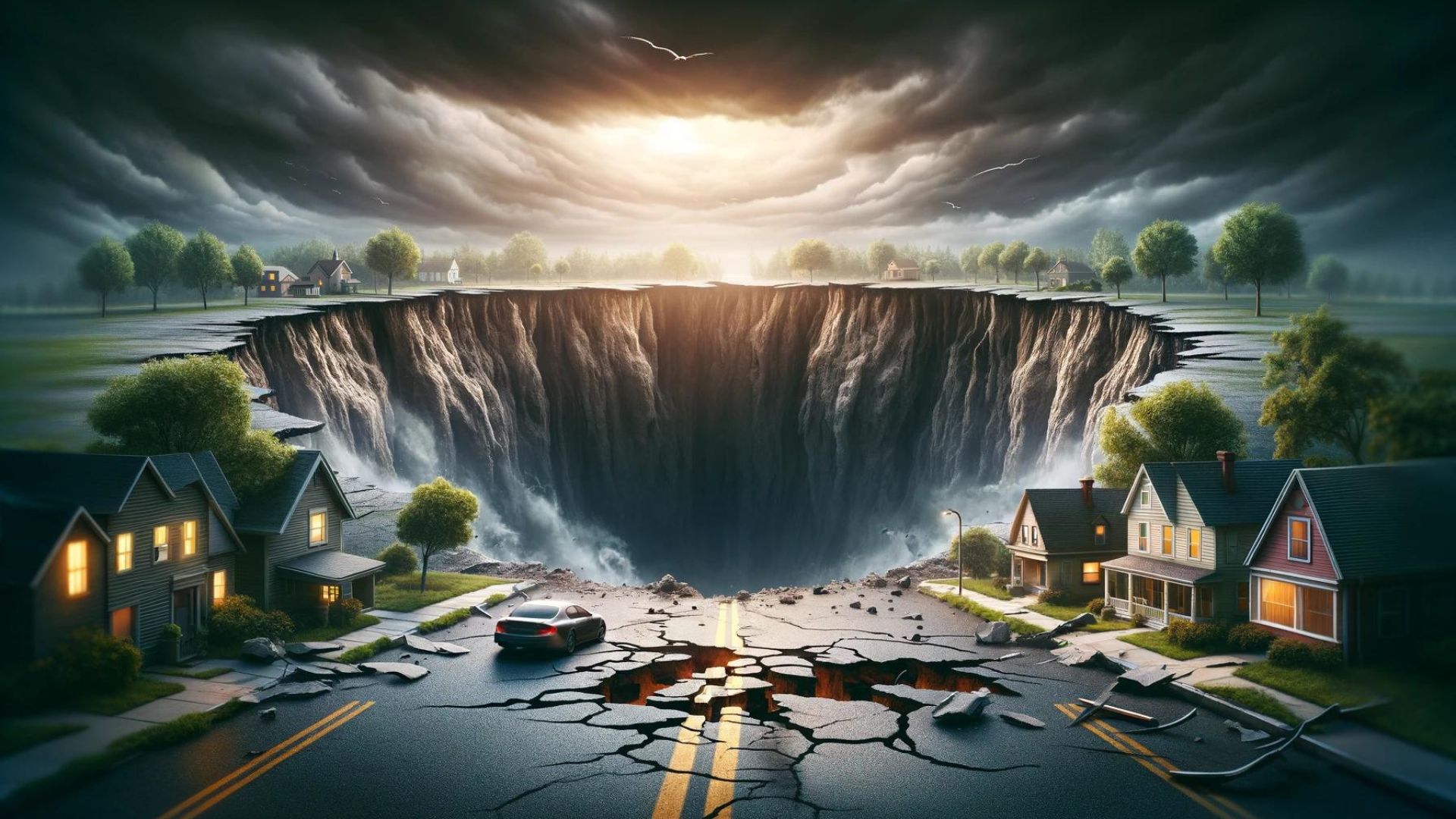Imagine the ground beneath your feet suddenly giving way. It sounds like something out of a disaster movie, but this phenomenon is very real. Sinkholes, those sudden collapses that can swallow cars and even houses, are a stark reminder of the Earth’s dynamic nature.
Geology in Action
Sinkholes form when the ground beneath the surface can no longer support itself. It’s like the Earth playing a disappearing act on itself! Most commonly, this happens when slightly acidic rainwater seeps through the soil and slowly dissolves bedrock made of limestone, salt, or other types of rock that dissolve easily. Over time, undergound caves and spaces form, and if the roof of one of these gets too thin – collapse!
Some sinkholes happen gradually, like bowl-shaped depressions. Others are catastrophic, with land vanishing in an instant. They can be small or big enough to swallow whole neighborhoods.
Unveiling Earth’s Secrets
While startling, sinkholes are also oddly beautiful. They offer a peek into the hidden layers of our planet – underground rivers or ancient fossils might be exposed! Some, like the Great Blue Hole in Belize, become natural wonders, drawing in divers and explorers.
Sinkholes remind us that the world beneath our feet is constantly changing. They are part of a delicate ecological balance. However, human activity like excessive groundwater pumping or development can disrupt that balance and make sinkholes more likely.
Preserving the Planet’s Wonders
How can we both appreciate these dramatic geologic events and protect ourselves from their potential dangers?
- Awareness is Key: Learn about the bedrock in your area to see if sinkholes are a risk.
- Respect Nature’s Processes: Support sustainable groundwater usage and responsible land-use practices.
- Advocate for Conservation: Support policies that protect vulnerable landscapes and minimize human-induced impacts.
Action Point
This week, take time to research unique natural wonders of your region. Are they facing any threats? Find out how you can support organizations dedicated to preserving these marvels of our amazing planet.
Why Should You Care?
- Understanding our Dynamic Planet: Sinkholes reveal the Earth’s ever-changing nature, reminding us of the hidden forces shaping our landscapes.
- Personal Safety: In some areas, sinkholes are a hazard. Awareness can help keep you, your family, and your property safe.
- Environmental Responsibility: Recognizing the delicate balance behind sinkhole formation promotes a broader awareness of how human activity impacts natural systems.
Key Takeaways
- Sinkholes are a natural phenomenon caused by the gradual or sudden collapse of the ground.
- They are most common in areas with soluble bedrock like limestone.
- While destructive, sinkholes can also be awe-inspiring and reveal ecological secrets.
- Human actions can disrupt natural processes and increase the risk of sinkholes in some areas.
- Understanding sinkholes fosters both a sense of wonder and a responsibility to preserve the Earth.
Keywords
- Sinkhole: A hole or depression in the ground formed by the collapse of the surface layer.
- Bedrock: The solid rock layer lying beneath soil and loose material on the Earth’s surface.
- Limestone: A sedimentary rock consisting mainly of calcium carbonate, susceptible to being dissolved by water.
- Soluble Rock Any type of rock that can be dissolved by water over time.
- Groundwater: Water present beneath the Earth’s surface in soil pores and rock fissures.
- Collapse: The sudden, dramatic caving in of the surface layer due to an underground void.
- Ecological Balance: The delicate equilibrium of relationships between organisms and their environment.
- Conservation: The protection and careful management of natural resources and the environment
- Natural Wonder: A unique and awe-inspiring feature of the natural world.
- Sustainable: Practices that meet present needs without compromising the ability of future generations to meet their own needs.
Frequently Asked Questions
- Can sinkholes be predicted? Scientists study potential areas, but prediction is difficult. Warning signs like ground cracks or doors/windows becoming hard to open can indicate a sinkhole risk.
- Are sinkholes ever beneficial? Some sinkholes act as natural drains, creating wetlands important to ecosystems. They also act as ‘time capsules’ for fossils!
- Can sinkholes be filled? Yes, but addressing the underlying cause (like unstable bedrock) is crucial for a long-term fix.
Myth Buster
- Myth: Sinkholes only form in exotic locations or specific regions.
- Truth: While more common in certain areas, sinkholes can occur almost anywhere with the right combination of bedrock and groundwater conditions.
Let’s Talk!
- Should areas with high sinkhole risk have stricter building codes or land-use regulations? Why or why not?
- How can we promote both a sense of wonder about the natural world alongside a sense of responsibility for preserving it?
Let’s continue the conversation in the comments!












0 Comments